 |
|
|
IPFCC’s Moving Forward with Patient- and Family-Centered Care Intensive Training Seminar is Coming to Chicago
|
|
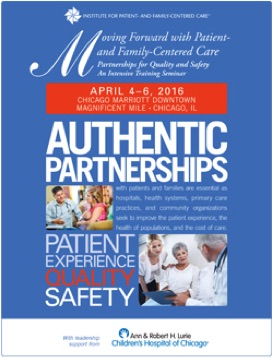 IPFCC’s Moving Forward with Patient- and Family-Centered Care: Partnerships for Quality and Safety, An Intensive Training Seminar is coming to Chicago, Illinois, April 4-6, 2016. Attend this Seminar to advance your understanding and practice of patient- and family-centered care. The Seminar models effective partnerships, and provides essential strategies and resources for developing and sustaining patient and family advisory councils and other collaborative endeavors with patients and families. IPFCC’s Moving Forward with Patient- and Family-Centered Care: Partnerships for Quality and Safety, An Intensive Training Seminar is coming to Chicago, Illinois, April 4-6, 2016. Attend this Seminar to advance your understanding and practice of patient- and family-centered care. The Seminar models effective partnerships, and provides essential strategies and resources for developing and sustaining patient and family advisory councils and other collaborative endeavors with patients and families.
The Seminar will feature special programming from Ann & Robert H. Lurie Children’s Hospital of Chicago that is relevant for health care for patients of all ages and their families, including:
- Transitions from Youth to Adult Health Care
- Partnerships in Research
- Peer Support: ParentWise® and PeerWise®
- Caring for Transgender Youth and Their Families
- High Reliability and the Link with Patient- and Family-Centered Care
Lurie Children’s is ranked 11th nationally and is the only Illinois pediatric hospital that qualified for the 2015-16 U.S. News & World Report Best Children’s Hospital Honor Roll. A tour of Lurie Children's Hospital, featuring innovative partnerships with the community, will be offered on Tuesday, April 5th, showcasing best practices in evidence based hospital design. Pre-registration is required for the tour as space is limited.

Many thanks to Ann & Robert H. Lurie Children's Hospital of Chicago for its leadership support.
Is Your Organization in a HEN or TCPI/PTN?
 The seminar offers many sessions that will be of particular interest for organizations that are part of a Hospital Engagement Network (HEN) or a Practice Transformation Network (PTN) of the Transforming Clinical Practices Initiative (TCPI). The seminar agenda indicates the sessions that The seminar offers many sessions that will be of particular interest for organizations that are part of a Hospital Engagement Network (HEN) or a Practice Transformation Network (PTN) of the Transforming Clinical Practices Initiative (TCPI). The seminar agenda indicates the sessions that present strategies to help you achieve the goals of both of these important initiatives. present strategies to help you achieve the goals of both of these important initiatives.
Register by February 19th for Early Bird Pricing for IPFCC’s Moving Forward with Patient- and Family-Centered Care Intensive Training Seminar
 Register by February 19th to take advantage of Early Bird pricing for IPFCC’s Moving Forward with Patient- and Family-Centered Care: Partnerships for Quality and Safety, An Intensive Training Seminar, to be held at the Chicago Marriott Downtown Magnificent Mile, Chicago, Illinois, April 4-6, 2016. Register by February 19th to take advantage of Early Bird pricing for IPFCC’s Moving Forward with Patient- and Family-Centered Care: Partnerships for Quality and Safety, An Intensive Training Seminar, to be held at the Chicago Marriott Downtown Magnificent Mile, Chicago, Illinois, April 4-6, 2016.
Seminar Brochure
Register Now
Questions? Please call 301-652-0281.
Earn Continuing Education Credit
Details about the availability for continuing education credits for Nurses, Physicians, Social Workers, Child Life Specialists, and Long Term Care Administrators can be found in the Seminar Brochure.
|
|
AMA Journal of Ethics: Promises and Challenges in Patient- and Family-Centered Care |
|

In its theme issue, Promises and Challenges in Patient- and Family-Centered Care, the January AMA Journal of Ethics considers some of the ethical challenges of implementing Patient- and Family-Centered Care (PFCC). Trisha Paul, theme issue editor, assembled this issue with the intent of “delving more deeply into ethical considerations inherent in PFCC” to generate “fresh insights into and broader understanding of how PFCC can enhance healing.” In an attempt to make this issue as “patient- and family-centered” as possible, Trisha invited feedback from the UMHS’s C.S. Mott Children’s Hospital PFAC and patients and family members are included as authors in this issue.
In Nothing About Us Without Us: Toward Patient- and Family-Centered Care, the editor notes that the January issue “aims to define and contextualize PFCC, particularly for those to whom this set of ideas is new.” Topics discussed in this issue include the integration of PFCC principles into coursework for medical students and how physical structures may influence collaboration that is crucial to PFCC. Also included is information about Patient and Family Advisory Councils (PFACs) and the impact they can have in implementing PFCC. A patient advocate and a physician share their views about PFCC as well. Case studies that raise ethical questions about implementing PFCC are included.
Learn more and read the January issue of the AMA Journal Of Ethics, Promises and Challenges in Patient- and Family-Centered Care.
|
American Medical Association’s Ethics Talk ~ Patient- and Family-Centered Care’s Reach |
|

As part of the theme issue of the AMA Journal of Ethics: Promises and Challenges in Patient- and Family-Centered Care (see related article above), editor Trisha Paul interviewed Kelly Parent about Patient-and Family-Centered Care’s Reach. Kelly is PFCC Program Manager at the University of Michigan Health System (UMHS) and IPFCC’s Program Specialist for Patient and Family Partnerships. Kelly is also the lead author of Teaching Patient- and Family-Centered Care: Integrating Shared Humanity into Medical Education Curricula, one of the articles in the theme issue.
In the audio podcast of Kelly’s interview,
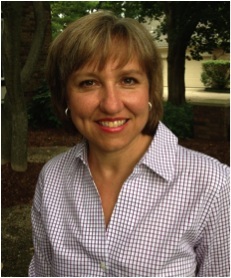 she describes patient- and family-centered care (PFCC), including the four core concepts, and explains that at UMHS, PFCC is both a philosophy and program. UMHS creates partnerships between patients and families and their clinicians, tapping into the wisdom that patients and families bring to the table. UMHS engages the voice of hundreds of patients and families across the entire health care continuum. she describes patient- and family-centered care (PFCC), including the four core concepts, and explains that at UMHS, PFCC is both a philosophy and program. UMHS creates partnerships between patients and families and their clinicians, tapping into the wisdom that patients and families bring to the table. UMHS engages the voice of hundreds of patients and families across the entire health care continuum.
According to Kelly, PFCC cuts across the tripartite mission of every academic health care center: providing excellent clinical care, advancing research, and providing world class education. In addition to engaging patients and families at the point of care and in the board room about clinical care, UMHS engages patents and families in their medical school, and other educational programs for allied health professionals, and involves patients and families in many aspects of research projects, including design, implementation, and dissemination of results. Read Teaching Patient- and Family-Centered Care: Integrating Shared Humanity into Medical Education Curricula, to learn more about PFCC in medical education at the University of Michigan Medical School.
According to Kelly, when done correctly, PFCC results in better clinical outcomes and higher satisfaction of patients, families, staff, and faculty. Better outcomes and happier people also positively affect the business model.
Listen to the entire interview.
|
Spotlight on Primary Care ~ The Power of Perspective
|
IPFCC is partnering with the Patient-Centered Primary Care Collaborative (PCPCC) as part of its Transforming Clinical Practice Initiative (TCPI) Support and Alignment Network (SAN). Each month this column will feature highlights from the field about how patients and families are partnering in practice transformation efforts. Learn more about this project.
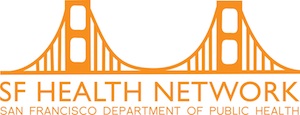
When the San Francisco Health Network (SFHN)* invited patients and families to partner on improvement efforts, a powerful shift in focus occurred. SFHN leaders were empowered with the evidence that showed improvements in care occur when patients and families are co-designers of their own health care. With an aim to increase patient and family engagement, connectedness, and continuity, SFHN leaders invited patients and families to partner with them on SFHN's goal to implement “team-based care.”
What the health care team learned from patients and families was powerful. With new perspectives, patients, families, and health care professionals shaped the communication strategies about the new model of care. Patients and families talked about how words and practices like “team-based care” are not familiar to patients. So they worked together—staff, patients, and families—on terminology and language for the new website and education materials. Working together, they used co-design tools like card sorting, observation, and prototyping to determine how best to convey and communicate information that is most valued by patients and families. They defined “team-based care” in ways that were important and clear to patients. Together they described the valuable role patients and their families can have as “part of the team.”
As co-designers, patients and families ensured SFHN’s goal was on target and in-focus. The patient and family perspective was the missing piece.
To learn more about this exciting work at SFHN, contact Amy Petersen at amy.petersen@sfdph.org.
*The San Francisco Health Network is a complete care system. It includes primary care for all ages, dentistry, emergency and trauma treatment, medical and surgical specialties, diagnostic testing, skilled nursing and rehabilitation, and behavioral health. University of California San Francisco (UCSF) physicians provide research and teaching expertise.
~~~~~~~~
IPFCC wants to hear your primary care stories of partnership in quality improvement and practice transformation. If you are already partnering with patients and families, or want to learn how, a free learning community is forming now. For more information, please contact Mary Minniti at mminniti@ipfcc.org or sign up on IPFCC's PFAC Network.
|
|
In This Issue |
- IPFCC’s Moving Forward with Patient- and Family-Centered Care Intensive Training Seminar is Coming to Chicago
- AMA Journal of Ethics: Promises and Challenges in Patient- and Family-Centered Care
- American Medical Association’s Ethics Talk ~ Patient-and Family-Centered Care’s Reach
- Spotlight on Primary Care ~ The Power of Perspective
- Enjoy the Sights of New York City! Come to The International Conference, Arrive Early or Stay Late!
- Webinars on Advancing Human Subjects Protection Programs for Patient-Centered Outcomes Research
- Privileged Presence: Personal Stories of Connections in Health Care Wins an American Journal of Nursing 2015 Book of the Year Award
|
Enjoy the Sights of New York City! Come to The International Conference, Arrive Early or Stay Late!
|
|
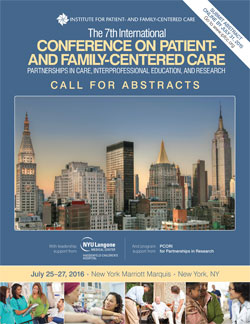 Join IPFCC in New York City, for The 7th International Conference on Patient- and Family-Centered Care: Partnerships in Care, Interprofessional Education, and Research, to be held July 25-27, 2016. Join IPFCC in New York City, for The 7th International Conference on Patient- and Family-Centered Care: Partnerships in Care, Interprofessional Education, and Research, to be held July 25-27, 2016.
New York City provides an exhilarating backdrop as a global hub for business and commerce that is internationally recognized as one of the world’s most spectacular cities. Its tremendous energy, excitement, and diversity sets it apart from all other destinations. Summer is a great time for you, your family, friends, and colleagues to take in all that NYC has to offer.
Enjoy the dazzling lights of Times Square and breathtaking views of the famous skyline from Top of the Rock Observation Deck, One World Observatory, or the Empire State Building. Take in a theater show on and off Broadway, visit renowned art museums, galleries, and monuments. In July, enjoy famous Central Park, and other lovely green spaces in NYC, attend major league sporting events, sample world famous shopping and restaurants, and tour the world famous Statue of Liberty and Ellis Island. NYC includes five boroughs—each with many neighborhoods—so the opportunities to sight-see, play, and learn are endless!
The International Conference will be held at the New York Marriott Marquis, located in the “Crossroads of the World.” Nestled in the heart of Times Square, this Broadway hotel is steps from the best attractions of the city, including Rockefeller Center, Radio City Music Hall, Central Park, Madison Square Garden, the Museum of Modern Art, Fifth Avenue shopping, and much more!
The New York Marriott Marquis is holding a limited number of rooms for Conference participants at group rate until July 5, 2016. Rooms may sell out before the cut-off date, so make your reservations early. When calling the hotel at (877) 303-0104, please indicate that you are with the IPFCC 2016 International Conference to receive the special group rate. Hotel reservations may also be made online.
Plan to join IPFCC's 7th International Conference in New York City, July 25-27, 2016. Learn more and register for the Conference.
|
IPFCC Webinars
|
|
Creating a Patient and Family Advisory Council
February 9, 2016
Join Julie Moretz, Vice Chancellor for Patient- and Family-Centered Care, University of Arkansas for Medical Sciences, and Hollis Guill Ryan, Program Coordinator of Patient and Family Centered Care at the University of Washington Medical Center, to explore best practices for starting a council. Recruiting and preparing advisors and staff to work in collaborative partnerships, developing an agenda, sharing useful resources and tools, are a few of the topics to be covered.
Partnering with Patients and Families Using Social Media, and Mobile and Virtual Technologies
February 18, 2016
Join Kelly Parent, IPFCC Program Specialist for Patient and Family Partnerships and PFCC Program Manager at the University of Michigan Health System (UMHS), and Juliette Schlucter, Director, Child and Family Experience, Sala Institute for Child and Family-Centered Care, NYU Langone Medical Center, to understand how social media, and mobile and virtual technologies can enhance patient- and family-centered collaboration.
IPFCC’s webinars are a cost-effective educational resource. Cost is per line, so a group of any size can participate from the same location on one line. Handouts and supplemental resources are included with registration.
Learn more about webinar faculty, learning objectives, and Pinwheel Sponsor discounts.
|
Webinars on Advancing Human Subjects Protection Programs for Patient-Centered Outcomes Research
|
|

Funded by PCORI, The Children’s Hospital of Philadelphia (CHOP) is hosting a new three-part webinar series that will introduce and include guidance on some of the most common human subjects protection challenges in Patient Centered Outcomes Research (PCOR).
The first webinar, Introduction to Human Subjects Protection Challenges in PCOR, on January 26, 2016, 12:00-1:00pm EST, is an introduction to human subjects protection challenges in participatory research. Presenters include Dr. Katherine Bevans (a PCOR investigator from CHOP), three IRB representatives (from CHOP and UPenn), and two family representatives.
Clarifying Definitions: Who Is A Human Subject? Is It Research? on February 8, 2016, 3:00-5:00pm EST, and Preparing Patients and Other Stakeholders to Uphold Ethical Research Principles on February 29, 2016, 3:00-5:00pm EST, will each be structured around a particular human subjects protection challenge. These two webinars will offer guidance and potential solutions to the challenge. Presenters will be selected at a later date.
Collaboration among researchers, IRB analysts, and patients and other stakeholders is critically needed to generate solutions to human subjects protection challenges. These three webinars will provide practical solutions to some of the pressing human subjects protection challenges in PCOR. Researchers, IRB leaders, patients and other stakeholders are encouraged to join.
These webinars are free, but
registration is required.
|
Links
|
|
|
Previous Issues |
|
|
About Us
|
Founded in 1992 as a nonprofit organization, the Institute for Patient- and Family-Centered Care works to advance the understanding and practice of patient- and family-centered care in all settings where individuals and families receive health care.
|
|
|
Privileged Presence: Personal Stories of Connections in Health Care Wins an American Journal of Nursing 2015 Book of the Year Award
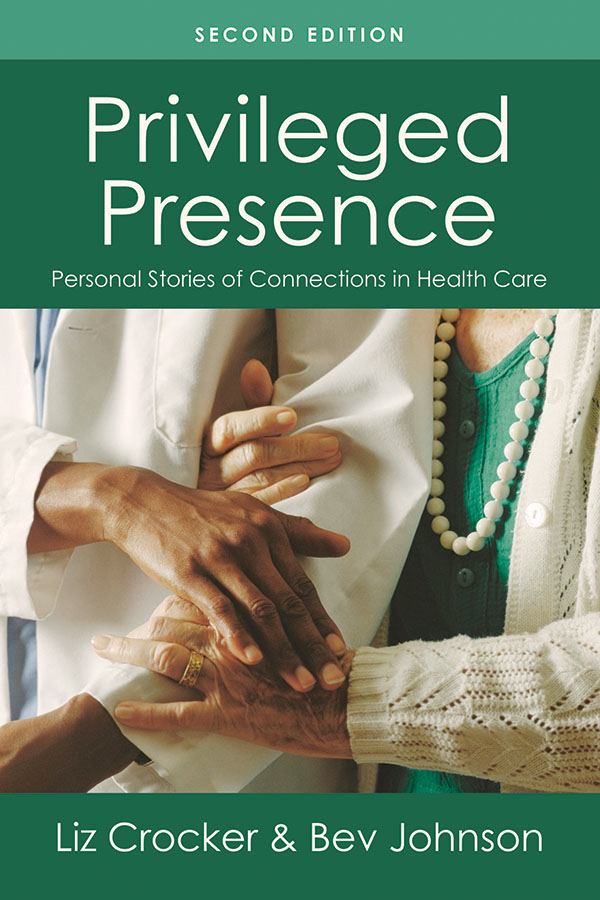 IPFCC is proud to announce that Privileged Presence: Personal Stories of Connections in Health Care (2nd edition) by IPFCC’s Liz Crocker and Bev Johnson, is the winner of an American Journal of Nursing (AJN) 2015 Book of the Year Silver Award in the category of Public Interest And Creative Works. Published by Bull Publishing Company, Privileged Presence is a collection of more than 65 stories that reflect people’s health care experiences from the points of view of compassion, communication, collaboration, respect, and dignity...or their absence. This new edition uses real-world experiences recounted by patients and their families, nurses, doctors, and other health care professionals to illustrate what works and what doesn’t, what increases or diminishes people’s sense of confidence and well-being. Tools for improving care and creating partnerships are included in the book. IPFCC is proud to announce that Privileged Presence: Personal Stories of Connections in Health Care (2nd edition) by IPFCC’s Liz Crocker and Bev Johnson, is the winner of an American Journal of Nursing (AJN) 2015 Book of the Year Silver Award in the category of Public Interest And Creative Works. Published by Bull Publishing Company, Privileged Presence is a collection of more than 65 stories that reflect people’s health care experiences from the points of view of compassion, communication, collaboration, respect, and dignity...or their absence. This new edition uses real-world experiences recounted by patients and their families, nurses, doctors, and other health care professionals to illustrate what works and what doesn’t, what increases or diminishes people’s sense of confidence and well-being. Tools for improving care and creating partnerships are included in the book.
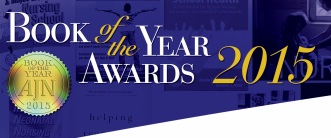 AJN Judge Cortney Davis. Kent, OH, The Kent State University Press, in selecting Privileged Presence, stated, in part: “Since the beginning of time, the personal story has been elemental—wired into the human brain—as a means of survival, a means of solving problems both for individuals and for the communities into which those individuals are born and ultimately die…The powerful tool in this collection … is the underlying faith that personal narratives can indeed address the crushing problems inherent in our current health care system.” Cortney also noted that this book is “helpful to a wide readership—the general reader and also health care providers, patients, and their family members. Read more of the judge's comments. AJN Judge Cortney Davis. Kent, OH, The Kent State University Press, in selecting Privileged Presence, stated, in part: “Since the beginning of time, the personal story has been elemental—wired into the human brain—as a means of survival, a means of solving problems both for individuals and for the communities into which those individuals are born and ultimately die…The powerful tool in this collection … is the underlying faith that personal narratives can indeed address the crushing problems inherent in our current health care system.” Cortney also noted that this book is “helpful to a wide readership—the general reader and also health care providers, patients, and their family members. Read more of the judge's comments.
Congratulations to Liz and Bev!
|
Institute for Patient- and Family-Centered Care
6917 Arlington Road, Suite 309 • Bethesda, MD 20814
301-652-0281
www.ipfcc.org |
|
|
